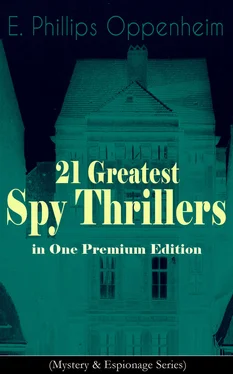“What the mischief can I do about it?” Hebblethwaite demanded irritably. “You are putting me in an impossible position. Let me ask you this, Wyatt. Is there anything at the back of your head that the man in the street doesn’t know about?”
“Yes!”
“What is it, then?”
“I have reasons to believe,” Wyatt announced deliberately, “reasons which are quite sufficient for me, although it was impossible for me to get up in Parliament and state them, that Germany is secretly making preparations for war either before the end of this year or the beginning of next.”
Hebblethwaite threw himself into an easy-chair.
“Sit down, Wyatt,” he said. “Your dinner can wait for a few minutes. I have had another man—only a youngster, and he doesn’t know anything—talking to me like that. We are fully acquainted with everything that is going on behind the scenes. All our negotiations with Germany are at this moment upon the most friendly footing. We haven’t a single matter in dispute. Old Busby, as you know, has been over in Berlin himself and has come back a confirmed pacifist. If he had his way, our army would practically cease to exist. He has been on the spot. He ought to know, and the army’s his job.”
“Busby,” Wyatt declared, “is the silliest old ass who ever escaped petticoats by the mere accident of sex. I tell you he is just the sort of idiot the Germans have been longing to get hold of and twist round their fingers. Before twelve months or two years have passed, you’ll curse the name of that man, when you look at the mess he has made of the army. Peace is all very well—universal peace. The only way we can secure it is by being a good deal stronger than we are at present.”
“That is your point of view,” Hebblethwaite reminded him. “I tell you frankly that I incline towards Busby’s.”
“Then you’ll eat your words,” Wyatt asserted, “before many months are out. I, too, have been in Germany lately, although I was careful to go as a tourist, and I have picked up a little information. I tell you it isn’t for nothing that Germany has a complete list of the whole of her rolling stock, the actual numbers in each compartment registered and reserved for the use of certain units of her troops. I tell you that from one end of the country to the other her state of military preparedness is amazing. She has but to press a button, and a million men have their rifles in their hands, their knapsacks on their backs, and each regiment knows exactly at which station and by what train to embark. She is making Zeppelins night and day, training her men till they drop with exhaustion. Krupp’s works are guarded by double lines of sentries. There are secrets there which no one can penetrate. And all the time she is building ships feverishly. Look here—you know my cousin, Lady Emily Fakenham?”
“Of course!”
“Only yesterday,” Wyatt continued impressively, “she showed me a letter—I read it, mind—from a cousin of Prince Hohenlowe. She met him at Monte Carlo this year, and they had a sort of flirtation. In the postscript he says: ‘If you take my advice, don’t go to Dinard this August. Don’t be further away from home than you can help at all this summer.’ What do you think that meant?”
“It sounds queer,” Hebblethwaite admitted.
“Germany is bound to have a knock at us,” Spencer Wyatt went on. “We’ve talked of it so long that the words pass over our heads, as it were, but she means it. And I tell you another thing. She means to do it while there’s a Radical Government in power here, and before Russia finishes her reorganisation scheme. I am not a soldier, Hebblethwaite, but the fellows we’ve got up at the top—not the soldiers themselves but the chaps like old Busby and Simons—are simply out and out rotters. That’s plain speaking, isn’t it, but you and I are the two men concerned in the government of this country who do talk common sense to one another. We’ve fine soldiers and fine organisers, but they’ve been given the go-by simply because they know their job and would insist upon doing it thoroughly, if at all. Russia will have another four million men ready to be called up by the end of 1915, and not only that, but what is more important, is that she’ll have the arms and the uniforms for them. Germany isn’t going to wait for that. I’ve thought it all out. We are going to get it in the neck before seven or eight months have passed, and if you want to know the truth, Hebblethwaite, that’s why I have taken a risk and ordered these ships. The navy is my care, and it’s my job to see that we keep it up to the proper standard. Whose votes rob me of my extra battleships? Why, just a handful of Labour men and Irishmen and cocoa Liberals, who haven’t an Imperial idea in their brains, who think war belongs to the horrors of the past, and think they’re doing their duty by what they call ‘keeping down expenses.’ Hang it, Hebblethwaite, it’s worse than a man who won’t pay fire insurance for his house in a dangerous neighbourhood, so as to save a bit of money! What I’ve done I stick to. Split on me, if you want to.”
“I don’t think I shall do that,” Hebblethwaite said, “but honestly, Wyatt, I can’t follow you in your war talk. We got over the Agadir trouble. We’ve got over a much worse one—the Balkan crisis. There isn’t a single contentious question before us just now. The sky is almost clear.”
“Believe me,” Wyatt insisted earnestly, “that’s just the time to look for the thunderbolt. Can’t you see that when Germany goes to war, it will be a war of conquest, the war which she has planned for all these years? She’ll choose her own time, and she’ll make a casus belli , right enough, when the time comes. Of course, she’d have taken advantage of the position last year, but she simply wasn’t ready. If you ask me, I believe she thinks herself now able to lick the whole of Europe. I am not at all sure, thanks to Busby and our last fifteen years’ military administration, that she wouldn’t have a good chance of doing it. Any way, I am not going to have my fleet cut down.”
“The country is prosperous,” Hebblethwaite acknowledged. “We can afford the ships.”
“Then look here, old chap,” Wyatt begged, “I am not pleading for my own sake, but the country’s. Keep your mouth shut. See what the next month or two brings. If there’s trouble—well, I don’t suppose I shall be jumped on then. If there isn’t, and you want a victim, here I am. I disobeyed orders flagrantly. My resignation is in my desk at any moment.”
Hebblethwaite glanced at the clock.
“I am very hungry,” he said, “and I have a long way to go for dinner. We’ll let it go at that, Wyatt. I’ll try and keep things quiet for you. If it comes out, well, you know the risk you run.”
“I know the bigger risk we are all running,” Wyatt declared, as he took a cigarette from an open box on the table by his side and turned towards the door. “I’ll manage the turtle soup now, with luck. You’re a good fellow, Hebblethwaite. I know it goes against the grain with you, but, by Jove, you may be thankful for this some time!”
The Right Honourable John William Hebblethwaite took the hat from his footman, stepped into his car, and was driven rapidly away. He leaned back among the cushions, more thoughtful than usual. There was a yellow moon in the sky, pale as yet. The streets were a tangled vortex of motorcars and taxies, all filled with men and women in evening dress. It was the height of a wonderful season. Everywhere was dominant the note of prosperity, gaiety, even splendour. The houses in Park Lane, flower-decked, displayed through their wide-flung windows a constant panorama of brilliantly-lit rooms. Every one was entertaining. In the Park on the other side were the usual crowd of earnest, hard-faced men and women, gathered in little groups around the orator of the moment. Hebblethwaite felt a queer premonition that evening. A man of sanguine temperament, thoroughly contented with himself and his position, he seemed almost for the first time in his life, to have doubts, to look into the future, to feel the rumblings of an earthquake, the great dramatic cry of a nation in the throes of suffering. Had they been wise, all these years, to have legislated as though the old dangers by land and sea had passed?—to have striven to make the people fat and prosperous, to have turned a deaf ear to every note of warning? Supposing the other thing were true! Supposing Norgate and Spencer Wyatt had found the truth! What would history have to say then of this Government of which he was so proud? Would it be possible that they had brought the country to a great prosperity by destroying the very bulwarks of its security?
Читать дальше












